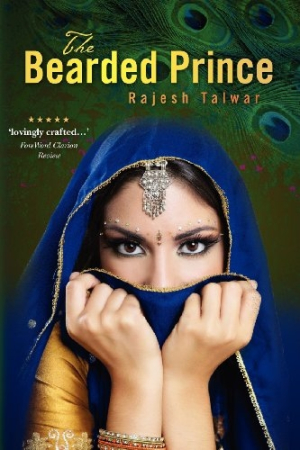The Bearded Prince
Without including magic, witches, curses, violence, or villains of any sort, Rajesh Talwar has lovingly crafted a short but big-hearted tale of a princess choosing a suitor in The Bearded Prince.
As with many works for children, The Bearded Prince contains a moral and teaches morals, but Talwar manages to present both unobtrusively. The language, names, and wording of the text are not dumbed down, as the author proudly states, but may be a tad challenging for young children. That said, most readers over the age of eight or nine could surely manage the book with a little help.
The princess of the story is Roopali, a lovely, gentle, and artistic young lady who is wise beyond her years. She holds a swayamvara, an Indian ceremony where a girl chooses from a parade of suitors. Roopali interviews would-be royal partners with alliterative names such as Amri of Amrikabad, Ash of Ashkabad, and Pan of Panidad. While on her quest to “meet the prince of her dreams,” she weighs many factors to find, as the author has her remark, one “deserving of me and I of him.”
The princess has some physical criteria such as, “I wouldn’t much care for a man with a beard.” She also believes it would be nice to find “a man who stood at least a couple of inches further away from the ground than she.” Roopali, however, is not so shallow as to be ruled simply by what is pleasing to the eye.
In a literary universe where “people assume that princes and princesses are bound to be good looking people,” Talwar has chosen to bend if not quite break that rule. “Anyone closely connected with royalty knows that there are ugly princes, short princesses, princes who are scarred, and princesses who lisp. God and nature has not made any special provision for princes and princesses that might make them in any way more appealing or attractive as human beings than the rest of us. Indeed, it would be fair to say that often,” concludes the author, “they seem to be below average in terms of their physical and mental accomplishments.”
Despite this refreshing republicanism, Princess Roopali is apparently quite lovely herself, and her name even means “the beautiful one.” Some of her royal suitors are also devastatingly attractive, but the princess, though tempted, wisely knows that “muscles alone [do] little to promote a happy marriage.”
While the title does give away the ending (no spoiler alert needed here), how and why the princess makes her choice, and why the bearded prince chooses to retain his facial hair even knowing of his newly beloved’s aversion to whiskers, is a tale in itself, and a charming one at that.
The Bearded Prince is a pleasant summer pick for young readers and a sweet bedtime story for little princesses everywhere.
Reviewed by
Mark McLaughlin
Disclosure: This article is not an endorsement, but a review. The publisher of this book provided free copies of the book and paid a small fee to have their book reviewed by a professional reviewer. Foreword Reviews and Clarion Reviews make no guarantee that the publisher will receive a positive review. Foreword Magazine, Inc. is disclosing this in accordance with the Federal Trade Commission’s 16 CFR, Part 255.

